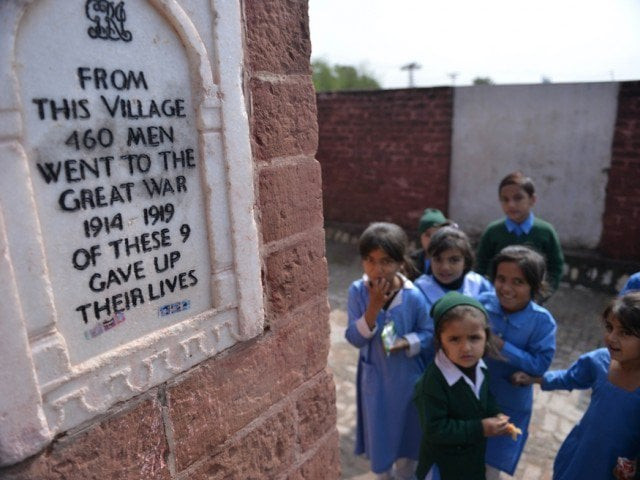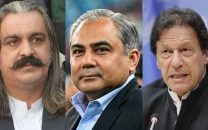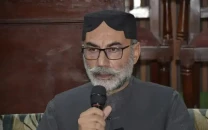The village in Punjab which fought in WW1
Dulmial's history has only been recently unearthed

In this photograph taken on October 29, 2014, schoolchildren stand beside a monument of the veterans of WWI at a school in the village of Dulmial in Chakwal district some 150kms south of Islamabad. PHOTO:AFP
Dulmial is Dr Irfan Malik's ancestral home, a GP who lives in Nottingham. Working with British and Pakistani historians, Dr Malik has unearthed the contribution of the village's men to the Great War.
Men from Dulmial were sent all over the world from the Western front to Tehran, Iran to Basra in present-day Iraq.
Unknown stories of Indian soldiers from WW1
“This was a massive contribution and almost every male who was able to in the village joined the army,” Dr Malik, 49, says. “They wouldn’t have understood where they were going or why but they would have been loyal to their rulers.”
There is a 12lb British cannon in Dulmial and a marble monument with the engraving ‘in recognition of services rendered by all ranks from this village’, honouring those who fought against the Central Powers.
According to Dr Malik’s research, British recruiters first arrived in the village in 1914 and were offering £30 for enlisting. Dulmial already had 21 pensioned Indian officers and 90 current serving sergeants at the time. After the recruiters’ visit, Captain E L Maxwell reported that there should be ‘no difficulty in getting men’ from the village.
This year’s commemoration of the Great War by the Royal British Legion is focusing on the huge sacrifice made by soldiers from the Commonwealth.
World leaders gather in Paris to mark 100th anniversary of WW1 Armistice
“Had I known this history as a kid I would have been more British and felt like I had more of a stake in Britain,” Dr Malik says. “We used to get abused by skinheads in the 70's saying ‘what have you done for our country?’. Our elders knew about this history but couldn’t articulate it.”
Among the recruits from Dulmial was Dr Malik’s paternal great-grandfather, Subedar Mohammed Khan, a soldier who had been celebrated in the 33rd Punjab Regiment on the frontiers of British India. Subedar Khan had already visited Britain for King George V’s coronation in 1911 and was present in Delhi Darbar when the King visited later that year.
Both his great grandfathers signed up to fight for the British in 1914 and, although already nearing the end of their careers, they were kept behind in India.
All of the men in Dulmial were to serve in the Punjab Regiment during the war, aside from 46 who joined the 27th Light Cavalry.
Around 50 of the Dulmial troops ended up on the Western Front – among them, a man called Lance Naik Ismail Khan, who was killed during the Battle of Loos in September 1915. His name appears on the Neuve-Chapelle memorial in France, which commemorates more than 4,700 Indian soldiers and labourers who lost their lives on the Western Front and have no known grave.
Europe, Middle East map redrawn by World War I
After the war ended in 1918, British authorities approached another decorated soldier, Captain Ghulam Mohammed, to ask how Dulmial’s contributions should be honoured. Instead of land or money, he chose the cannon which remains in the village today. It was transported by oxen cart in 1925 and presented by Field Marshal William Birdwood.
“We just want the acknowledgement that our ancestors also answered the call to arms in vast numbers,” Dr Malik says. “We want people to know that we were there too.”
This article originally appeared on the Telegraph.



















COMMENTS
Comments are moderated and generally will be posted if they are on-topic and not abusive.
For more information, please see our Comments FAQ